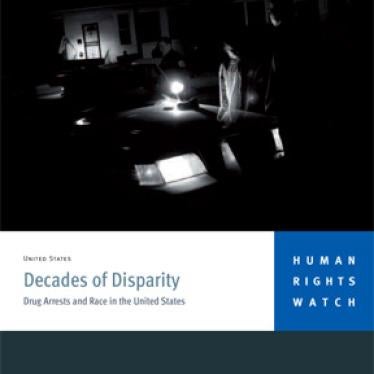(Washington, DC) - The US Sentencing Commission's unanimous vote on June 30, 2011, to make new federal crack cocaine sentencing guidelines retroactive, is consistent with internationally recognized human rights principles, Human Rights Watch said today. These include the right to benefit from sentence reductions made after commission of a crime as well as the right to be free of racial discrimination. The guidelines reduce sentences for crack cocaine possession. However, further reforms are required to bring the United States into full compliance with its international human rights obligations.
In 2010, President Barack Obama signed into law the Fair Sentencing Act (FSA), which reduced the differences in federal sentencing for crack cocaine compared to those for powder cocaine offenses. Prior to the FSA, a person convicted of an offense involving possession of crack cocaine would get the same mandatory prison term as someone with 100 times that amount of powder cocaine. The FSA increased the amounts of crack cocaine that trigger mandatory minimum sentences for federal crack cocaine crimes, thereby reducing the differential from 100-1 to 18-1.
The FSA also directed the US Sentencing Commission to change the current drug weights for crack cocaine sentences in the US Sentencing Guidelines. After proposing permanent guideline changes in April, the commission voted at the June 30 hearing to make its guidelines retroactive.
At the hearing, commissioners emphasized the fundamental fairness of making the guidelines retroactive. Commissioner William B. Carr stated that it would be "incongruous, if not unconscionable" to fail to make the FSA guidelines retroactive. Commissioner Ricardo Hinojosa said it was "the just, the fair, and the right thing to do."
Human Rights Watch agrees. The International Covenant on Civil and Political Rights, ratified by the US, states under article 15 that if sentencing laws reduce the penalties for a crime subsequent to the commission of the crime, "the offender shall benefit thereby."
International human rights law also obligates the United States to amend, rescind, or nullify any law that has the effect of perpetuating racial discrimination. Under the International Convention on the Elimination of All Forms of Racial Discrimination, which the US has ratified, governments must act affirmatively to prevent or end policies with unjustified discriminatory effect, regardless of their purpose.
Because of existing patterns of drug law enforcement, African Americans in the United States have disproportionately borne the burden of the far harsher sentences for crack offenses. In 2008, 80 percent of federal defendants sentenced for crack cocaine offenses were African American. But, according to federal drug use surveys, 27 percent of crack cocaine users were African American and 65 percent were white. The disproportionate number of African American drug offenders sentenced for crack cocaine offenses helps explain the far longer average sentence lengths for all African American federal drug offenders.
The US Sentencing Commission estimates that its decision to allow retroactive application of its new crack cocaine sentencing guidelines will make 12,040 cocaine offenders eligible to receive a reduced sentence. The average sentence reduction for eligible offenders will be approximately 37 months, but even after reduction, the average sentence will be about 10 years because of mandatory minimums.
While the June 30 action by the US Sentencing Commission will provide the possibility of sentence reductions for thousands of offenders, it will not help all prisoners sentenced to mandatory minimums enacted prior to the current FSA. Even with this vote, prisoners who have not yet served their full mandatory minimum sentence will not be eligible for a sentence reduction below that minimum. This shortcoming is contrary to US obligations under article 15 of the International Covenant on Civil and Political Rights. The Fair Sentencing Clarification Act, a bipartisan bill introduced on June 23 by Rep. Bobby Scott, authorizes sentence reductions that would bring previously imposed sentences in line with the current mandatory minimums.
Because of the fundamental injustice in condemning offenders to longer sentences simply because they committed their crime prior to enactment of the FSA, Human Rights Watch urges enactment of the FSA Clarification Act.







